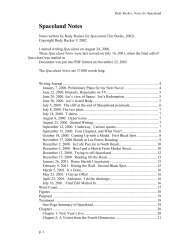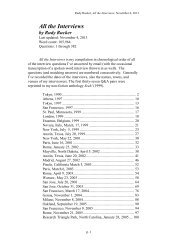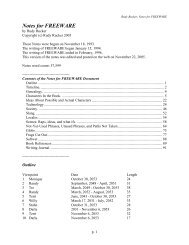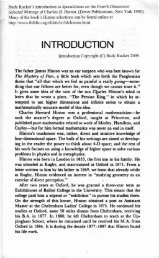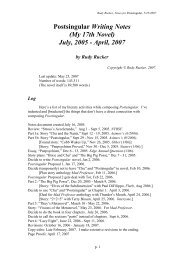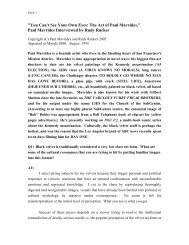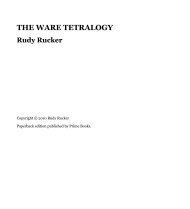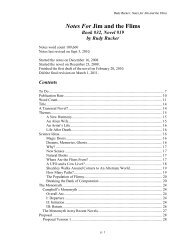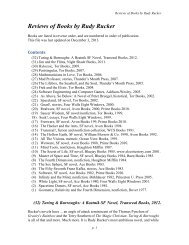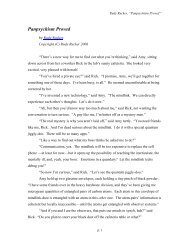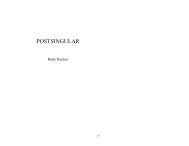Notes for the Lifebox, the Seashell, and the Soul - Rudy Rucker
Notes for the Lifebox, the Seashell, and the Soul - Rudy Rucker
Notes for the Lifebox, the Seashell, and the Soul - Rudy Rucker
You also want an ePaper? Increase the reach of your titles
YUMPU automatically turns print PDFs into web optimized ePapers that Google loves.
<strong>Notes</strong> <strong>for</strong> The <strong>Lifebox</strong>, <strong>the</strong> <strong>Seashell</strong>, <strong>and</strong> <strong>the</strong> <strong>Soul</strong>, by <strong>Rudy</strong> <strong>Rucker</strong><br />
The interesting question is whe<strong>the</strong>r simulationrowcount can be less than rowcount.<br />
If we are pessimists, <strong>the</strong>n we might worry that <strong>the</strong> cost of having Rule 110 (<strong>and</strong> thus<br />
<strong>the</strong> computation C110) simulate a step of Predictor might be in fact arbitrarily large, subject<br />
to <strong>the</strong> current state of <strong>the</strong> computation in progress, so that simulationrowcount is very much<br />
larger than <strong>the</strong> modest size of PredictorRuntime(rowcount, input) would lead us to expect. If<br />
<strong>for</strong> instance we need to keep sending in<strong>for</strong>mation back <strong>and</strong> <strong>for</strong>th through <strong>the</strong> computational<br />
space by means of “gliders,” <strong>the</strong>n it could be that, <strong>the</strong> larger <strong>the</strong> computation gets, <strong>the</strong> slower<br />
it runs — this would be akin to having to take into account <strong>the</strong> limitations of <strong>the</strong> speed of<br />
light in <strong>the</strong> functioning of a very large electronic computer.<br />
But let’s give Wolfram a break here, let’s optimistically suppose that <strong>the</strong> way that<br />
Rule 110 emulates <strong>the</strong> computation of Predictor involves a fixed maximum cost of StepCost<br />
steps per computational step of Predictor. So <strong>the</strong>n we would expect to have<br />
simulationrowcount = StepCost * PredictorRuntime(rowcount, input)<br />
º StepCost *(log(rowcount)+log(input))<br />
The interesting situation of Rule 110 “outrunning” itself occurs if<br />
simulationrowcount < rowcount<br />
Wolfram seems to think that this situation would lead to a contradiction involving an<br />
infinite descending sequence of positive natural numbers derived from nesting <strong>the</strong><br />
simulations.<br />
But if you analyze it closely, <strong>the</strong> descending chain will stop as soon as one crosses a<br />
cost-benefit condition whereby <strong>the</strong> overhead of simulation cost swamps <strong>the</strong> gain of<br />
successive levels of simulation. [There will be two overhead costs to take into account: (a)<br />
<strong>the</strong> constant StepCost multiplier already mentioned <strong>and</strong> (b) <strong>the</strong> cost of inputting larger <strong>and</strong><br />
larger strings as <strong>the</strong> initial conditions so as to simulate more <strong>and</strong> more refined kinds of<br />
computations.]<br />
So my impression is that Wolfram’s briefly sketched argument doesn’t work.<br />
The Universal Unpredictability Lemma<br />
I’m interested in finding some support <strong>for</strong> <strong>the</strong> following statement.<br />
Universal Unpredictability Lemma.<br />
Most naturally occurring universal computations are unpredictable.<br />
As I mentioned be<strong>for</strong>e, by “unpredictable” I mean “not being emulable by a<br />
computation whose runtime is logarithmically faster.” Wolfram prefers <strong>the</strong> word irreducible<br />
<strong>for</strong> what I call unpredictable.<br />
Perhaps Turing’s Corollary that universal computations are runtime unbounded might<br />
be viewed as a kind of inspiration <strong>for</strong> what Wolfram would really like to be true: that a<br />
universal computation must be unpredictable. But <strong>the</strong> two properties have no direct<br />
connection that I can see.<br />
Wolfram offers <strong>the</strong> following very brief proof sketch of why a universal computation<br />
should be irreducible or unpredictable in <strong>the</strong> sense that <strong>the</strong>re won’t be a computation that<br />
consistently predicts <strong>the</strong> universal system’s results faster than <strong>the</strong> system in question.<br />
[Wolfram omits to mention that he really means logarithmically faster, but he should, as it’s<br />
completely trivial get linear speedups of any computation simply by using more states.]<br />
“Consider trying to outrun <strong>the</strong> evolution of a universal system. Since such a system<br />
p. 97





